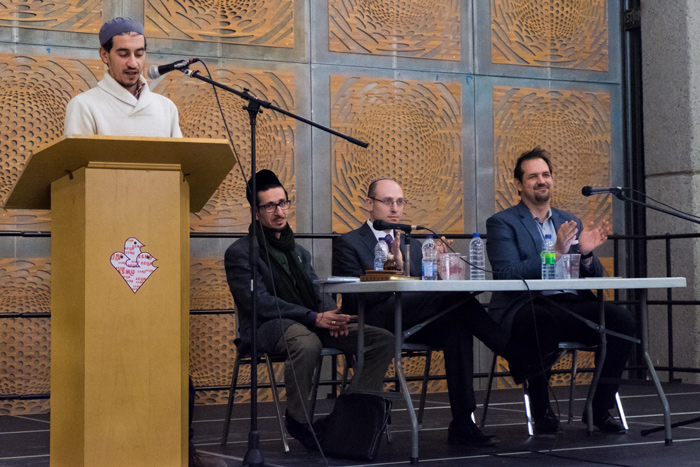Uncover McGill, a series of talks across six days aimed at sparking conversations about spirituality-related topics among members of the McGill community began on Jan. 16. The first day’s panel, “A Dialogue on God”, hosted in the Students’ Society of McGill University (SSMU) ballroom, discussed the meaning of forgiveness and justice among the three monotheistic Abrahamic religions—Islam, Judaism, and Christianity—featured Shaykh Hamdi Ben Aissa, Rabbi Mark Fishman, and Christian scholar Abdu Murray. The talks are organized and hosted by Hillel McGill, the Muslim Students’ Association (MSA), Newman Catholic Students’ Society, Power to Change, ICON, McGill Christian Fellowship, Ravi Zacharias International Ministries, in addition to a collaboration with Queer McGill.
Islam
“What is forgiveness?” asked Shaykh Hamdi Ben Aissa from the Sanad Collective, an Ottawa-based group of Islamic chaplains, teachers, and elders. “Forgiveness is the way to heal the pain we have caused others, caused by ourselves, and being caused by others.”
Speaking to students and faculty members, Shaykh Hamdi emphasized that forgiveness is a critical aspect in Islam by referring to the story of the Garden of Eden. Unlike Christianity, Islam does not believe in the concept of original sin, which is the idea that all human beings share Adam’s sin and must be redeemed by God.
“We don’t see prophet Adam as having caused us to leave the Garden,” Shaykh Hamdi said. “For Muslims, Adam’s story is not one about blame and guilt, but it is about the glory of forgiveness, and the beauty of being able to seek it and receive it.”
Judaism
Rabbi Mark Fishman, from Congregation Beth Tikvah in the West Island of Montreal, began his talk by pointing out that Judaism shares a very different view of forgiveness.
“There is a famous statement made in Judaism,” Rabbi Fishman said. “Before a person can gain forgiveness from God, they first have to be able to gain forgiveness from their fellow human being. If indeed you haven’t received that type of forgiveness from your fellow, it’s not going to help much because heaven isn’t going to help you either.”
Rabbi Fishman cited a story from The Sunflower, a book written by Holocaust survivor Simon Wiesenthal. In the book, Wiesenthal recalls his experience in a concentration camp with a terminally ill Nazi soldier. The soldier, who knows he is going to die soon, asks Wiesenthal for forgiveness; the Nazi soldier passes away before Wiesenthal responds.
Wiesenthal asked leading scholars around the world, including Jewish, Islamic, and Christian intellectuals, whether they would have forgiven the Nazi.
“And, fascinatingly, the overwhelming majority of Christians who wrote their responses was, ‘Yes, we could forgive.’ And almost every single Jewish response that was given was, ‘No, we don’t forgive,’” Rabbi Fishman said.
Rabbi Fishman added that he didn’t believe the Jewish response was an overwhelming ‘no’ because of Wiesenthal’s ethnicity, but instead underlines the differences in beliefs on the idea of forgiveness.
Christianity
Abdu Murray, the North American Director of Ravi Zacharias International Ministries, highlighted the seemingly paradoxical nature of justice and forgiveness: Justice is getting what one deserves, while forgiveness is receiving something one does not deserve.
From a Christian theological standpoint, however, God must be both just and forgiving.
“If God is a maximally great being, […] then his justice is a powerful, great-making virtue [that] can never be compromised,” Murray said. “And his forgiveness, which is a powerful, great-making virtue, can never be compromised.”
Murray points to Jesus’ resurrection as a prime example of how God can be just and forgiving: Jesus Christ was nailed on the cross to pay for the sins of mankind, and the resurrection of Jesus proved God’s power to forgive.
“There is a consequence that if you accept the gift God has given you, there is a condition […] before you accept, Jesus says, ‘I get to change you,’” Murray said.







